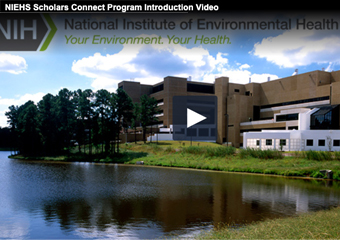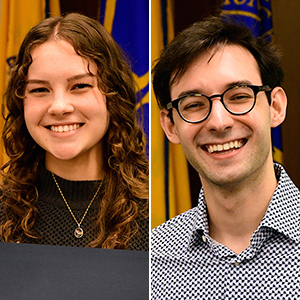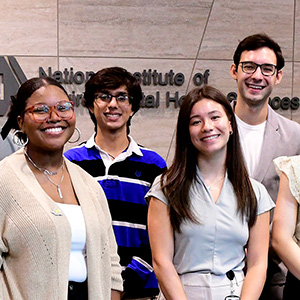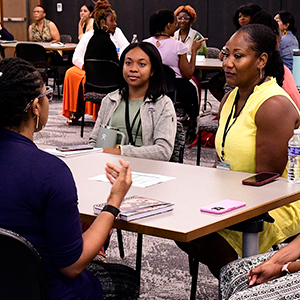The NIEHS Scholars Connect Program (NSCP) marked the end the 2018-2019 internships on April 19 with its annual Spring Symposium. Each of the 10 undergraduate scholars formally presented her work.
Mackenzie Roberts, from Duke University, and Suzanna Kafer, from North Carolina State University (NCSU), tied for the top award. Hannah Schrader, also from NCSU, received honorable mention.
“I’m very proud of all these young ladies,” said Ericka Reid, Ph.D., director of the NIEHS Office of Science Education and Diversity. “They’ve done a magnificent job.”
Chandra Jackson, Ph.D., chaired the symposium. She leads the NIEHS Social and Environmental Determinants of Health Equity Group.
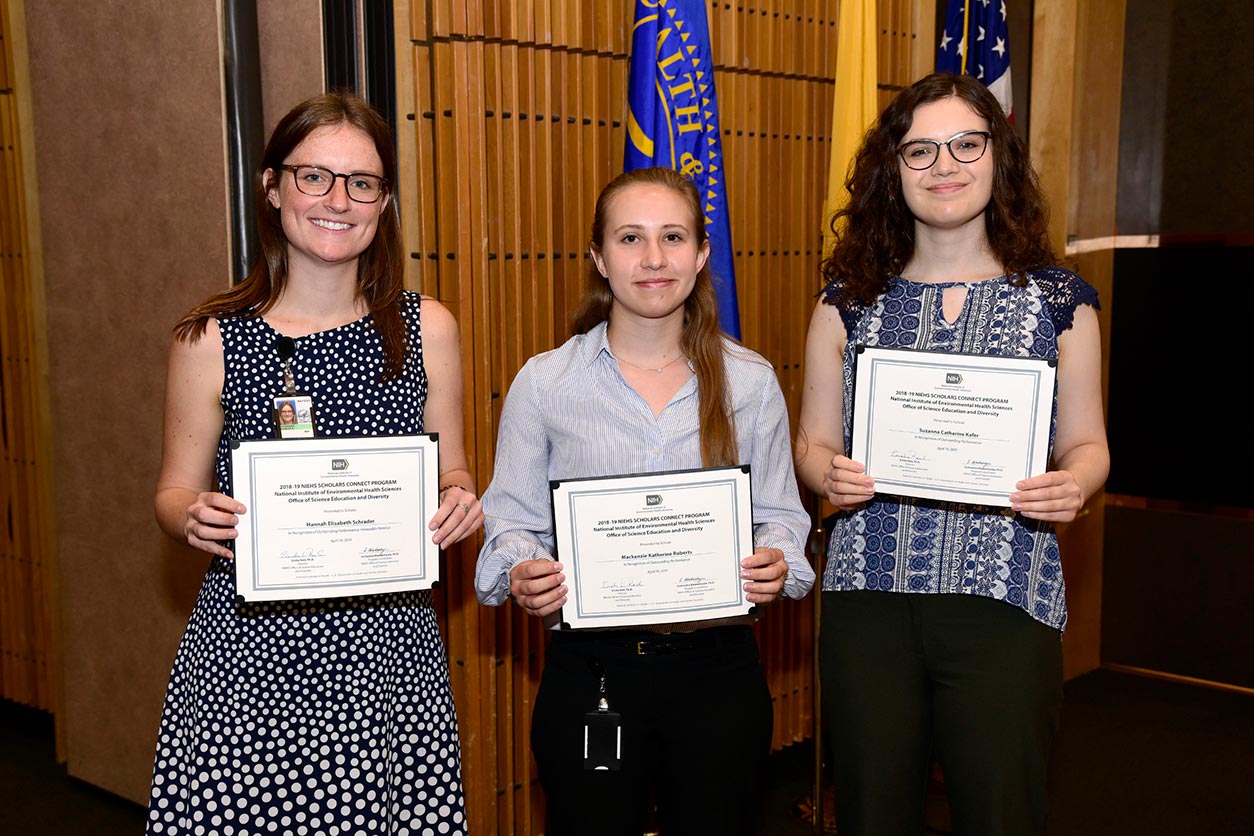 From right, Outstanding Scholars Kafer and Roberts, and Schrader, who received Honorable Mention. (Photo courtesy of Steve McCaw)
From right, Outstanding Scholars Kafer and Roberts, and Schrader, who received Honorable Mention. (Photo courtesy of Steve McCaw)Three recognized as top scholars
Selection of the Outstanding Scholar is based on activities over the course of the year, including attendance, presentations, and feedback from mentors. The competition was tight.
“I really appreciate all of the support and mentorship I received,” said Roberts. She studied the effects of inflammatory protein aggregates, called ASC specks, on brain cells. “We isolated the specks from activated cells, then treated [other cells] with the specks to see how the cells responded.”
“Mackenzie was a great choice for us,” said her mentor, G.J. (Jean) Harry, Ph.D., head of the National Toxicology Program (NTP) Neurotoxicology Group. “She has interest, capability, and confidence. And she’s having fun.”
Curiosity and work ethic — a winning combination
Kafer took on the question of why clomid, a common infertility drug, works better for some women than others. She studied a condition called unexplained infertility, looking for links between the thinness of the uterine lining after clomid treatment and changes in estrogen response and inflammation.
Her mentor, Steve Wu, Ph.D., from the Reproductive and Developmental Biology Lab (RDBL), said Kafer has curiosity, an important characteristic in a successful scientist. “Suzi is a dedicated researcher who is willing to step out of her comfort zone and spend time to address scientific questions,” Wu said.
Schrader explored how mutations in a gene called RMRP affected mitochondrial dysfunction in developing zebrafish. Such mutations can cause cartilage-hair hypoplasia, otherwise known as severe dwarfism, in humans.
NSCP helps build networks
This year, for the first time, the deans of graduate admissions from NCSU, Duke University Medical School, and the University of North Carolina at Chapel Hill (UNC) took part in the program’s seminar series. In another first, every participant presented her work in a forum or conference outside NIEHS, although doing so is not a program requirement.
“It’s amazing the networks the students can build and the feedback they get,” said NSCP Coordinator Suchandra Bhattacharjee, Ph.D.
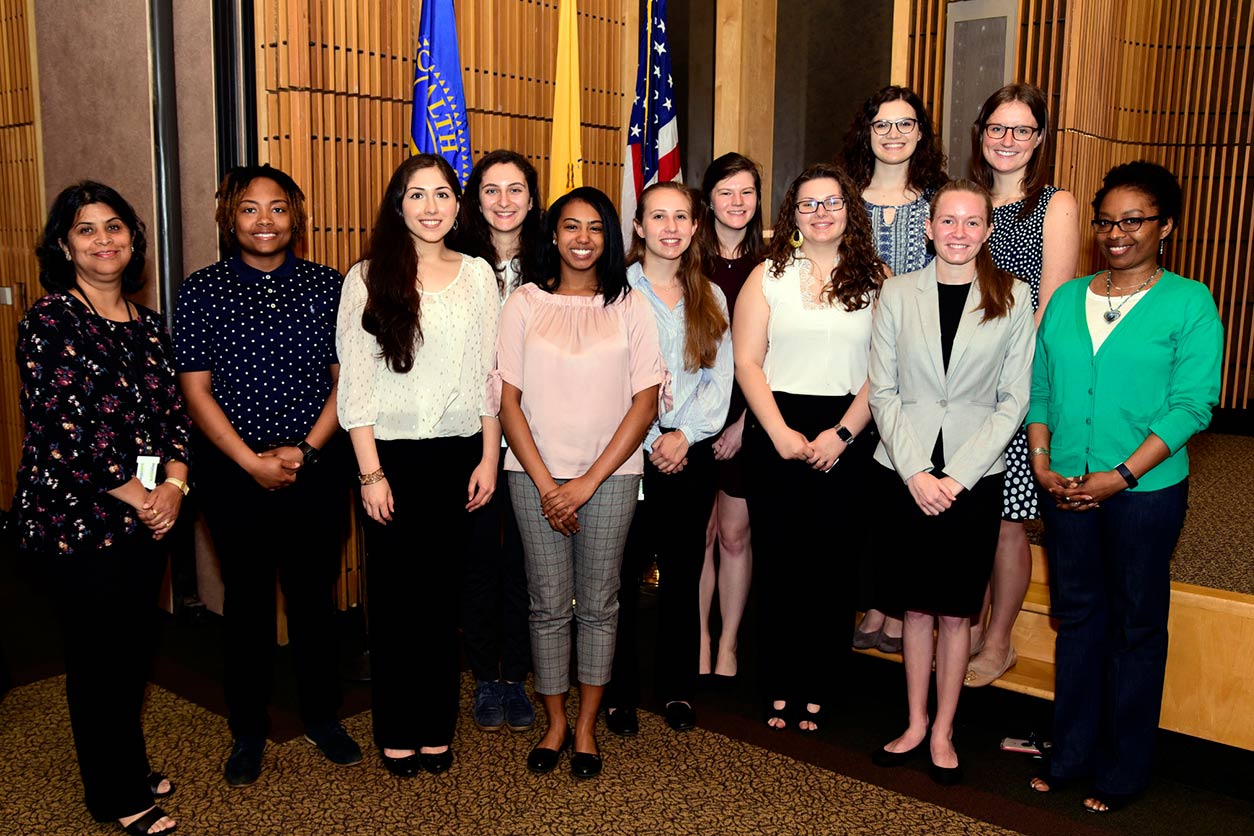 From left, Bhattacharjee and the NSCP Class of 2018-2019 — Parks, Qureshi, Hossamy, Lawrence, Roberts, Lola, Pots, Kafer, Russ, and Schrader, with Reid. (Photo courtesy of Steve McCaw)
From left, Bhattacharjee and the NSCP Class of 2018-2019 — Parks, Qureshi, Hossamy, Lawrence, Roberts, Lola, Pots, Kafer, Russ, and Schrader, with Reid. (Photo courtesy of Steve McCaw)Building confidence
“For a lot of them, their biggest takeaway is ‘I can do this,’” said Reid. “They grow in confidence from the day they walk through our door.”
“These scholars also have their school work, grad school applications, and serve as NSCP ambassadors to the community,” Bhattacharjee noted. “They all have excellent work ethics.”
Since 2012, NSCP has recruited students from underrepresented groups for research training and mentorship at NIEHS through paid internships for three semesters, beginning in June. The program supports the NIEHS Strategic Plan goal of promoting a diverse environmental health science workforce by encouraging scholars to pursue careers in the field, or in science, technology, engineering, and math.
“I’ve been involved in NSCP since it started, and it has evolved into a magnificent program,” said Harry.
The 2019-2020 program will begin June 3 with 10 participants who come from St. Augustine’s University, William Peace University, North Carolina Central University, NCSU, and UNC.
(John Yewell is a contract writer for the NIEHS Office of Communications and Public Liaison.)





